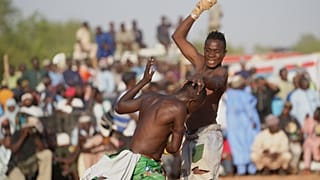South Africa
South African Olympic champion runner Caster Semenya is ending a seven-year legal challenge against sex eligibility rules in track and field. Her lawyer said on Thursday that they won’t be taking her appeal back to the Swiss Supreme Court, despite winning a ruling at the European Court of Human Rights in July.
Semanya has two Olympic gold medals in the 800 meters but in 2019 was banned from running the race at major international meets including the Olympics and world championships. Sports officials wanted her to take medication to artificially reduce her hormone levels.
She’s been fighting a legal battle against the rules enforced by World Athletics governing body since 2018, with her case reviewed by three courts including the Swiss Federal Tribunal.
She has argued that the rules infringed her rights. She lost her appeals at the Court of Arbitration for Sport and at the Swiss Federal Tribunal.
However, the European Court of Human Rights ruled in July that she hadn’t had a fair hearing at the Swiss tribunal and it hadn’t properly considered some of the complex arguments. That opened an avenue for her to continue her challenge.
Career ending regulations
Semenya was the world’s dominant middle-distance runner and was unbeaten in more than 30 races when she was barred. Now 34, she has moved into coaching, with the regulations effectively ending her career.
She has been the face of fiercely contentious sex eligibility rules in sports since she won the world championships as a teenager in 2009 and was forced to undergo sex verification tests. Semenya has one of a number of conditions known as differences in sex development, or DSD. She has the typical male XY chromosome pattern but also female physical traits and high levels of naturally occurring testosterone. DSD conditions are sometimes called intersex conditions.
Semenya is not transgender despite her case often being conflated with the divisive debate over the participation of transgender athletes in female competitions. She was identified as female at birth, raised as a girl, and has always identified as female.
World Athletics says Semenya and a small number of other DSD athletes in international track have testosterone levels in the male range, giving them an unfair advantage over other women because of the hormone’s connection to muscle mass and cardio-vascular performance.
How much advantage DSD athletes gain from testosterone has been disputed in one of the many complex details of Semenya’s landmark case.













01:00
From Milano Cortina to Dakar 2026: Olympic mascots Tina and Ayo share the stage
01:32
Milan Winter Olympics open with glittering ceremony
00:56
Milano ready to host Olympics, protests against ICE presence continue
01:42
United Nations and IOC calls for pause in wars during Winter Olympics
Go to video
Indonesian weightlifter wins record-breaking 79kg gold at Southeast Asian Games
01:05
IOC meeting takes place in Lausanne ahead of the Winter Olympics